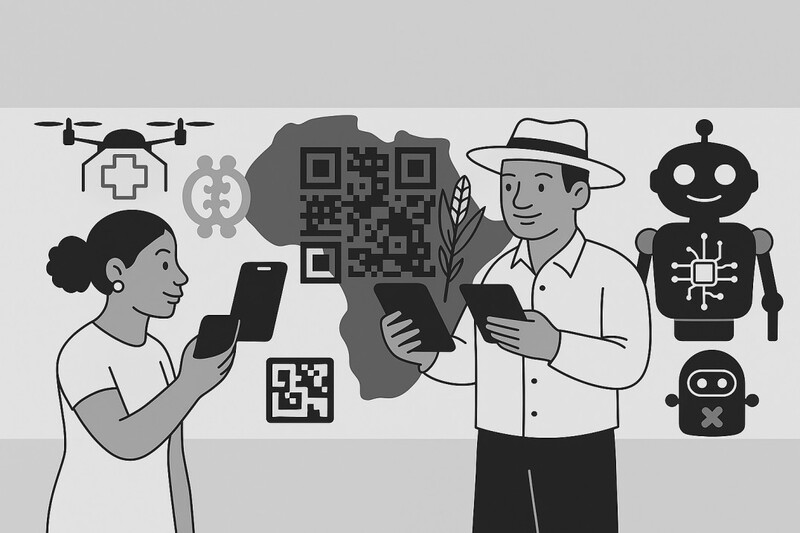 Starlink satellites being deployed. Photo Credits: SpaceX
Starlink satellites being deployed. Photo Credits: SpaceX
Starlink's, Africa's Technological Dilemma: A Clash Of Innovation And Regulation
Africa
Technology
Starlink has been facing different challenges in Africa as it seeks entry into the continent’s market. The company aims to revolutionize the Internet space in Africa by making it affordable and convenient to all users. Since its entry into the Kenyan market in July 2023, it has created stiff competition for local Internet providers.
Despite being one of the largest Internet providers in Kenya, companies like Safaricom have been on the receiving end as people seek new Internet services from Starlink. Its competitive pricing has made it possible for users to experience higher Internet speeds compared to local Internet service providers, whose offerings are often slower and more expensive.
Local Providers Push Back Against Competition
The rise of Starlink has raised concerns among local providers. These companies worry they could be pushed out of the market if the government does not take action. The Communication Authority of Kenya (CA) has already sought guidance from the United Nations International Telecommunication Union to develop policies for regulating international satellite Internet providers like Starlink.
For security and regulatory reasons, Safaricom has proposed that Starlink should consider partnering with local Internet service providers. Legal battles have ensued as local providers attempt to prevent Starlink from gaining a dominant market share in Kenya.
Regulatory Hurdles in Namibia
The challenges are not limited to Kenya. In Namibia, Starlink has encountered significant regulatory resistance. The Communications Regulatory Authority of Namibia (CRAN) issued a cease-and-desist order against the company, citing its lack of a government-issued operating license.
Namibia, known for its vast rural areas with limited Internet infrastructure, saw Starlink as a potential game-changer. The company's high-speed Internet service appealed to both urban and rural users alike. However, CRAN has not only stopped operations but has also confiscated Starlink equipment from consumers and initiated legal proceedings against individuals using the service.
Until Starlink secures a proper license from the Namibian government, it is barred from resuming operations in the country.
A Continent Still Struggling with Internet Access
Africa continues to experience low Internet penetration. Only a few countries—such as Morocco, Libya, and Seychelles—report relatively high Internet penetration, with average rates around 80%. In contrast, the rest of the continent struggles with affordability and accessibility of Internet services.
As the continent grows and digital demand rises, the need for reliable Internet access becomes increasingly urgent. However, local Internet providers across Africa often fall short, particularly in delivering consistent broadband services to both urban and rural communities.
The Road Ahead for Starlink and African Connectivity
Companies like Starlink see an opportunity to bridge Africa’s digital divide. However, the regulatory challenges faced in Kenya and Namibia underline the need for innovative tech companies to fully comply with local laws and licensing frameworks when expanding into the African market.
At the same time, local Internet service providers must also rise to the occasion by improving service quality and affordability to remain competitive in the changing landscape.
Despite being one of the largest Internet providers in Kenya, companies like Safaricom have been on the receiving end as people seek new Internet services from Starlink. Its competitive pricing has made it possible for users to experience higher Internet speeds compared to local Internet service providers, whose offerings are often slower and more expensive.
Local Providers Push Back Against Competition
The rise of Starlink has raised concerns among local providers. These companies worry they could be pushed out of the market if the government does not take action. The Communication Authority of Kenya (CA) has already sought guidance from the United Nations International Telecommunication Union to develop policies for regulating international satellite Internet providers like Starlink.
For security and regulatory reasons, Safaricom has proposed that Starlink should consider partnering with local Internet service providers. Legal battles have ensued as local providers attempt to prevent Starlink from gaining a dominant market share in Kenya.
Regulatory Hurdles in Namibia
The challenges are not limited to Kenya. In Namibia, Starlink has encountered significant regulatory resistance. The Communications Regulatory Authority of Namibia (CRAN) issued a cease-and-desist order against the company, citing its lack of a government-issued operating license.
Namibia, known for its vast rural areas with limited Internet infrastructure, saw Starlink as a potential game-changer. The company's high-speed Internet service appealed to both urban and rural users alike. However, CRAN has not only stopped operations but has also confiscated Starlink equipment from consumers and initiated legal proceedings against individuals using the service.
Until Starlink secures a proper license from the Namibian government, it is barred from resuming operations in the country.
A Continent Still Struggling with Internet Access
Africa continues to experience low Internet penetration. Only a few countries—such as Morocco, Libya, and Seychelles—report relatively high Internet penetration, with average rates around 80%. In contrast, the rest of the continent struggles with affordability and accessibility of Internet services.
As the continent grows and digital demand rises, the need for reliable Internet access becomes increasingly urgent. However, local Internet providers across Africa often fall short, particularly in delivering consistent broadband services to both urban and rural communities.
The Road Ahead for Starlink and African Connectivity
Companies like Starlink see an opportunity to bridge Africa’s digital divide. However, the regulatory challenges faced in Kenya and Namibia underline the need for innovative tech companies to fully comply with local laws and licensing frameworks when expanding into the African market.
At the same time, local Internet service providers must also rise to the occasion by improving service quality and affordability to remain competitive in the changing landscape.
Senior Editor: Kenneth Njoroge
Financial Expert/Bsc. Commerce/CPA
